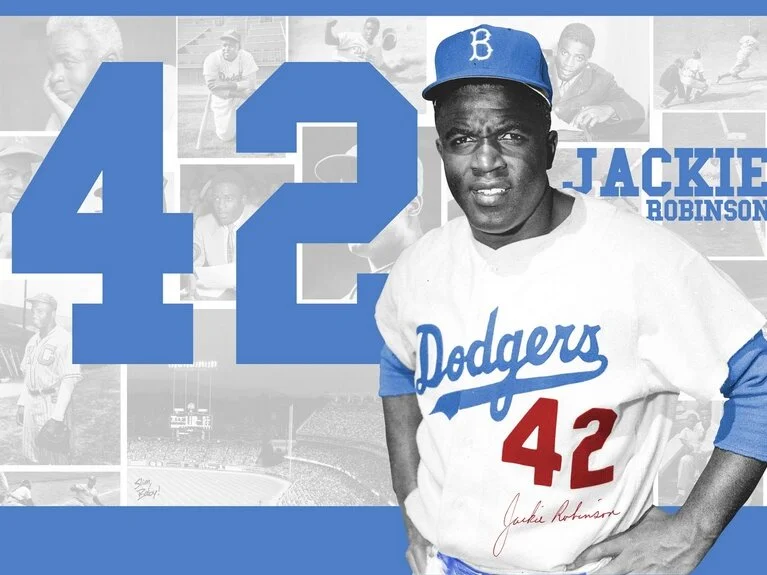The Boys of Summer.
While the 1947 Dodgers spring training began, Dodgers manager Leo Durocher’s ability to handle the press was beneficial to Jackie Robinson. Durocher was very open and brash with the media, which allowed him to deflect some of the attention away from Robinson.
Despite these positive characteristics that would surely help Robinson guide his way through a tumultuous 1947 season, Durocher had his own off the field issues. Always a gambler and hustler, Durocher became good friends with Hollywood actor George Raft. Raft was a big name in Hollywood and was known for his gangster roles in movies that featured other Hollywood legends such as James Cagney, Edward G. Robinson, Humphrey Bogart, Gary Cooper, Fredric March, Spencer Tracy, Henry Fonda, and Pat O’Brien.
Two legends: Jackie Robinson with a young Muhammaed Ali.
Rickey decided to use his ace in the hole, Happy Chandler, a second time. In November, Rickey sent Arthur Mann, his new assistant, to Chicago, to arrange a meeting between the commissioner and Durocher. Mann told Chandler of Rickey’s wish. In their meeting, Mann impressed on Chandler to use any reasonable method for telling Durocher emphatically that he must sever connections of all kinds with people regarded as undesirable by baseball—gangsters, known gamblers, companions of known gamblers, and racketeers. Regardless of names or identity, he was to cut ties with anybody whose reputation could hurt Durocher or baseball.
In November 1946, Durocher agreed to meet with Chandler, who produced a list of men to ignore, including Raft and Seigel, among others. The commissioner was firm, but reasonable, telling the Dodgers manager that as long as he stayed away from such undesirables and wasn’t putting baseball in a vulnerable position, he would have no problems. Durocher agreed, although admitted that it would be tough. While the two were meeting, Durocher took the time to drop more controversial news, possibly making matters worse. He told Chandler that he was marrying actress Laraine Day after her divorce was final. Back in the late 1940s, infidelity and divorce were seen as indecent and viewed differently from today and could be illegal in some instances.
Jackie Robinson stealing home.
Durocher neglected to tell the commissioner that when he first met Laraine in 1942, he was married. (His divorce from Grace Dozier went through in 1943). Chandler hoped the furor subside, but in January 1947, Day and Durocher’s marriage hit the headlines. The Day had filed for divorce from her husband, Ray Hendricks, a bandleader and manager of the Santa Monica airport. Hendricks accused Durocher of stealing Day’s affections.
The press loved it. A divorce settlement soon was reached, but the California divorce decreed a year’s wait before Day could remarry. However, Day darted across the border to Juarez, Mexico, to obtain a “quickie divorce.” She then returned to El Paso, Texas, and married Durocher the same Day, January 21, 1947.
In California, another judge, George Dockweiler, granted Day’s interlocutory divorce decree, now considered charging her with adultery. In the eyes of the California court, Day remained married to Hendricks. With her actions in Texas, she now had two husbands. Durocher realized that Dockweiler had capitalized on their celebrity status to make his point. Dockweiler admitted he would not have pressed another, a less recognized couple so hard. Durocher openly criticized the judge as pious and hypocritical, along with pushing his Christian morals on others.
Robinson’s sliding into home with Gil Hodges watching.




